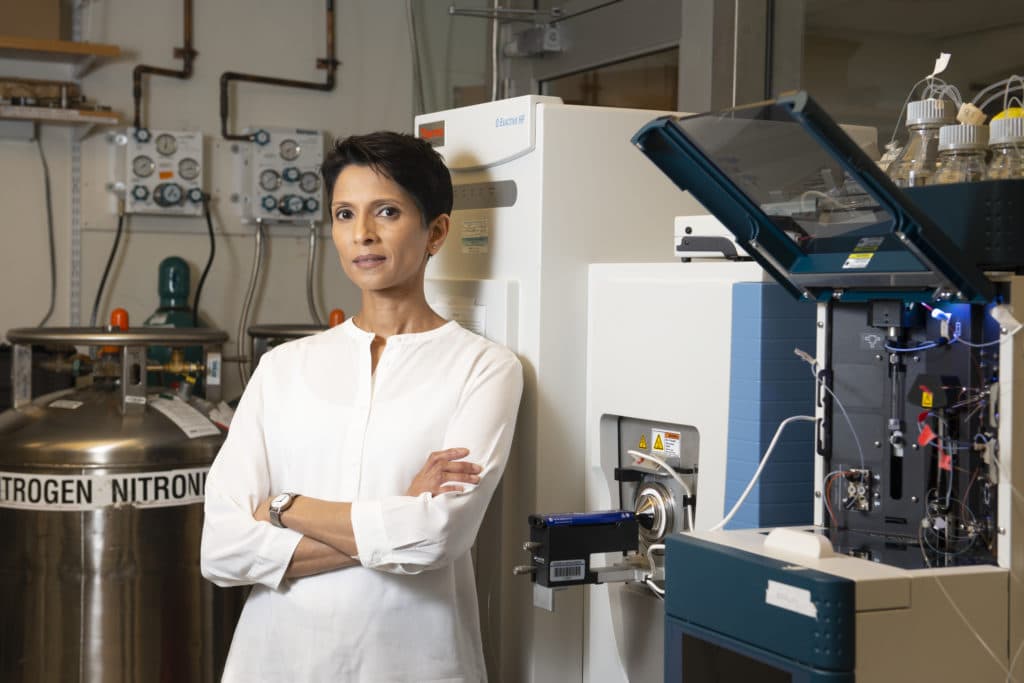La AFTD y la ADDF anuncian cuatro nuevos premios de investigación

La AFTD y la Alzheimer's Drug Discovery Foundation (ADDF) han otorgado cuatro nuevas subvenciones de investigación, por un total de $3,4 millones, para avanzar en la ciencia de la FTD y acelerar el desarrollo de nuevos tratamientos.
“Este tipo de compromiso proporciona un apoyo fundamental para financiar la investigación que examina las múltiples vías biológicas que se cree causan estas enfermedades. Nuestros cuatro nuevos premios de investigación son excelentes ejemplos de esto”, explica Susan LJ Dickinson, directora ejecutiva de la AFTD.
The awards were announced in late September, during Semana Mundial de Concientización sobre FTD 2020.
Judith Steen, PhD, Associate Professor of Neurobiology at Harvard Medical School (en la foto de arriba), received an award through ADDF’s Acelerador de diagnóstico. She will develop a blood test to distinguish between tau and TDP-43 protein accumulations – biomarkers that are fingerprints of FTD and other neurodegenerative diseases. “Proteomics, the study of proteins, is an important avenue of FTD scientific investigation, one that AFTD has supported for a long time,” said Debra Niehoff, Ph.D., AFTD Research Manager. “This area holds much promise for future diagnosis and treatments.”
El laboratorio del Dr. Steen ha sido pionero en métodos para identificar diferentes proteínas con el más alto nivel de precisión. Mediante un análisis de sangre, un médico podría hacer un diagnóstico diferencial de FTD e inscribir a las personas en los ensayos clínicos adecuados: un paso importante hacia la determinación de qué terapias pueden ofrecer esperanza.
The drug rotigotine is commonly used to treat Parkinson’s. But when Giacomo Koch, MD, PhD, and his colleagues at the Santa Lucia Foundation in Rome ran a clinical trial that repurposed rotigotine for Alzheimer’s patients, they discovered improved cognitive function for those with mild-to-moderate disease. Now, through a grant through the TreatFTD Fund, Dr. Koch will launch a study with rotigotine to learn if persons with behavioral variant FTD can benefit.
Other newly funded research includes the work of Emiliano Santarnecchi, PhD, and a team from Beth Israel Deaconess Medical Center, who will explore if a low-intensity brain stimulation device can modify FTD symptoms. Dr. Santarnecchi also received an award through the TreatFTD Fund, which was made possible by generous multi-year commitments from the Samuel I. Newhouse Foundation and the Lauder Foundation, Leonard Lauder, and Ronald S. Lauder.
"Todos los días, nos mantenemos enfocados estratégicamente para avanzar en la investigación con el mayor potencial para mejorar la calidad de vida de las personas con FTD y, en última instancia, erradicar esta insidiosa enfermedad cerebral", dijo Penny Dacks, PhD, directora senior de iniciativas científicas de la AFTD.
Dieter Edbauer, MD, y sus colegas del Centro Alemán de Enfermedades Neurodegenerativas en Bonn están desarrollando un tratamiento mediante inmunoterapia para atacar la C9orf72 mutation – a common genetic cause of FTD and ALS. Dr. Edbauer’s award was made through the Acelerar el descubrimiento de fármacos para la FTD Fund.
Por categoria
Nuestros boletines
Mantente informado
Regístrese ahora y manténgase al tanto de las últimas novedades con nuestro boletín informativo, alertas de eventos y más...
